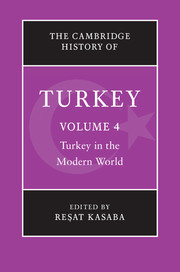Book contents
- Frontmatter
- 1 Introduction
- PART I OTTOMAN BACKGROUND AND TRANSITION
- PART II REPUBLIC OF TURKEY
- 7 Migration and Turkey: the dynamics of state, society and politics
- 8 The migration story of Turks in Germany: from the beginning to the end
- 9 Politics and political parties in Republican Turkey
- 10 Economic change in twentieth-century Turkey: is the glass more than half full?
- 11 Ideology, context and interest: the Turkish military
- 12 Kurds and the Turkish State
- 13 Islam and politics in contemporary Turkey
- 14 Sufism and Islamic groups in contemporary Turkey
- 15 Contestation and collaboration: women’s struggles for empowerment in Turkey
- 16 Art and architecture in modern Turkey: the Republican period
- 17 The novel in Turkish: narrative tradition to Nobel prize
- 18 A brief history of modern Istanbul
- Select bibliography
- Index
- References
13 - Islam and politics in contemporary Turkey
from PART II - REPUBLIC OF TURKEY
Published online by Cambridge University Press: 28 November 2009
- Frontmatter
- 1 Introduction
- PART I OTTOMAN BACKGROUND AND TRANSITION
- PART II REPUBLIC OF TURKEY
- 7 Migration and Turkey: the dynamics of state, society and politics
- 8 The migration story of Turks in Germany: from the beginning to the end
- 9 Politics and political parties in Republican Turkey
- 10 Economic change in twentieth-century Turkey: is the glass more than half full?
- 11 Ideology, context and interest: the Turkish military
- 12 Kurds and the Turkish State
- 13 Islam and politics in contemporary Turkey
- 14 Sufism and Islamic groups in contemporary Turkey
- 15 Contestation and collaboration: women’s struggles for empowerment in Turkey
- 16 Art and architecture in modern Turkey: the Republican period
- 17 The novel in Turkish: narrative tradition to Nobel prize
- 18 A brief history of modern Istanbul
- Select bibliography
- Index
- References
Summary
Introduction
The role of Islam in the public and political spheres has been a matter of contestation throughout the history of the Turkish Republic. After its founding in 1923 under the leadership of Mustafa Kemal, the state institutionalised the acquisition of Western cultural habits and the banishment of Islam from public and political arenas, although movement in this direction had begun a century earlier. It was not until the 1950s that Islam regained a foothold in the political arena, and only in the 1980s did the first Islamist political parties become popular. Since the 1980s, the re-emergence of religiously identified parties has reshaped the Turkish political scene, both challenging and accommodating official state secularism.
The Turkish state’s position on religion (laiklik) is more accurately translated as ‘laicism’, the subordination of religion to the state, than secularism, a separation of church and state. The term ‘secular’ is used here to refer to a non-religious identity or one that consigns religious beliefs to the private, rather than public, realm. The laic state controls the education of religious professionals and their assignment to mosques, controls the content of religious education, and enforces laws about the wearing of religious symbols and clothing in public spaces and institutions. In the early Republican period, the state established control of religious affairs and institutions, although independent religious brotherhoods continued clandestinely.
Supporters of Mustafa Kemal’s laicist reforms are called Kemalists, as distinguished from Islamists, self-ascriptive terms referring to groups of people polarised around certain issues and representing extremes on a continuum of beliefs about the proper role of religion in society and politics.
- Type
- Chapter
- Information
- The Cambridge History of Turkey , pp. 357 - 380Publisher: Cambridge University PressPrint publication year: 2008
References
- 7
- Cited by

